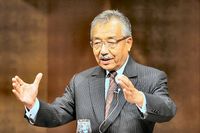


Toshio Matsuda, Commentator & Intl Economist
Straight from the Shoulder No.484
Official Website : http://www.chokugen.com/e/
FAX: 011 81 3 5965-0064
BackNumber is HERE!
Tomorrow is Already Past
Since last year, I have continued to assert that the market would shift
from this summer. This prediction was corroborated on August 8, the opening
day of the Beijing Olympics. Ever since the collapse of the Soviet Union
in 1991, the term “Cold War” has virtually vanished from most all dictionaries.
But this concept was vividly resurrected on August 8 when Russian forces
attacked the Georgian army in the breakaway region of South Ossetia.
The U.S. housing and financial boom, which from 2002 to 2006 rapidly drove the American economy and also brought prolonged prosperity to Japan exceeding, in length, the famous Izanagi boom of the late 1960s, heated up considerably. The resulting bubble eventually moved toward collapse from the summer of last year. At the present time, the winds of recession are raging across both the U.S. and Japanese economies. While the watchword on the market has been, “Future prospects are cloudy,” I have stated: “A new locomotive for the U.S. economy will appear from August. That will be a shift from the intangible to the tangible, from the soft to the hard sectors, with a world war breaking out to support that trend.” To stock investors, and particularly to those for whom I provide private consulting services, I furnished advice on the need to switch over to war-related stocks and the timing for such moves.
There are reasons that I have persistently indicated the month of “August” from last year. Looking back now, we can see that concerns over the excesses of the subprime loan fiasco were first recognized in February 2006. This consisted of the confirmation of signs of disturbances at Bear Stearns ( where an old friend of mine is on the top management team). Right after that, a separate acquaintance at Lehman Brothers pointed out similar facts to me. Despite understanding from the beginning of 2006 that the housing bubble, now known as the “subprime loan crisis,” was headed toward a breakdown, the Dow-Jones industrial average climbed to a new record high of $14,000 on July 19, 2007, and then on to $14,198 on October 11. The market headed sharply south thereafter, plummeting to north of the $11,000 level where it remains at present.
With the current market driven by buy and sell double option hedge funds, the power to uplift the market actually kicked in at the very point in time that the collapse of the housing bubble was set to play out. As the buying then peaked out in terms of available capital, the market suddenly shifted to the sell mode. This is the basic flow of the market, which leads to the question of whether both normal institutional investors and individual investors will find themselves severely buffeted by this flow, or be able to deftly catch the wave.
The September 11, 2001 terrorist attacks in New York and Washington D.C. prompted the U.S.-led war on terror, with the U.S. economy pulling out of recession and moving into a boom. Much like that time, a symbol is necessary for the market world at the time of a turnabout. Please make no mistake about this. The 9/11 attacks were not the decisive factor in the transition of the U.S. into a war economy from the end of 2001. Those bombings, rather, were nothing more than a convenient symbol for changes that were bound to come about anyway.
More recently, as the world moved into 2008 and it became clear that selling was now approaching the limits in terms of capital, the search for something symbolic turned up in the form of the Beijing Olympics. This is background for my pet expression ? “Tomorrow is already past.”
The Changing World
The changes from this summer will comprise a shift in the information that moves the market from economic fundamentals to politics. This, in fact, is the most important point. Next comes the change in direction for the Chinese economy, which has wielded such a major impact on the economies of the U.S. and Japan. What I am referring to is the fact that China, taking into account the global economic pullback, was already moving away from its conventional dependence on external demand to a policy favoring domestic demand dependence two months before the Olympics opened.
Japan, naturally, will also be compelled to adopt the same type of expansion in domestic demand from here on. In response, the U.S. economy, against the backdrop of a cheap dollar environment, will engineer a policy shift from domestic to external demand dependence. In a prolonged cold war state, the age of pursuing high-risk/high-return has come to an end, with moves emerging based on the safety-first rule. This is why the global stock market remains so slack right now.
Japan, which has no real ties to world politics and in fact is not allowed to have such interaction (because it is not a nuclear power), is seeking to extricate itself from the global political scene like PM Fukuda’ given away and in doing so become a safe haven for the world where there is too much money with no strategy.
Ultimately, Tokyo will rise to replace New York as the global financial center managed not by Japan. What is necessary for the Japanese economy from here on, therefore, is not a strategic supplemental budget, but rather doing nothing but wait for the influx of international capital that will be occurred soon.
For any person who wishes to quote from passages or articles in “Straight from Shoulder”,
mail to : masuda@chokugen.com
BackNumber is HERE!